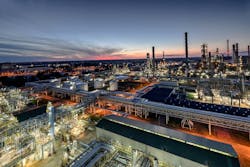PKN Orlen lets contract for Plock petrochemicals expansion
Polski Koncern Naftowy SA (PKN Orlen) has let a contract to Fluor Corp. to provide technical consultancy and project management contractor (PMC+) services for a project to expand olefins production at its 327,300-b/d integrated refining and petrochemical complex in Plock, Poland.
As part of the technical consultancy and PMC contract, Fluor will deliver end-to-end project management across all functional areas—from managing its timescales, costs, contractors and risks, through ensuring work safety, technical support, and supervision of technical design standards, to managing procurement and actual execution, PKN Orlen said.
The project will engage a fully integrated team made up of PKN Orlen employees and a PMC+ consultant, according to the operator.
“We have taken another major step towards the key milestone in our plans to develop the petrochemical business, which is the olefin plant extension. Petrochemicals have enormous potential we are determined to make the most of. Our capital projects to develop the petrochemical area will solidify our position on the European market while providing tangible benefits to the Polish economy, turning it from an importer into a net exporter of petrochemicals,” said Daniel Obajtek, president of PKN Orlen’s management board.
While it disclosed no further details regarding the contract, PKN Orlen said the value of the petrochemicals and base plastics market is forecast to double by 2030, with demand for petrochemicals set to rise, fueled by the world’s expanding population, economic growth, and shifts in demand for industrial raw materials.
PKN Orlen’s Petrochemicals Development Programme (PDP) positions the company to take full advantage of its potential in petrochemicals, the operator said.
The company said it expects investments under the PDP to add some 30% to PKN Orlen’s existing capacity, while ensuring a marked improvement in Poland’s overall trade balance in petrochemicals.
Launched in 2018 and requiring an estimated investment of about 8.3 billion zloty, the PDP will be implemented through yearend 2023.
Alongside launching a new research and development center in 2020 to generate a range of proprietary technologies, PKN Orlen also said ongoing PDP projects to expand the phenol capacity and construct an aromatic derivatives plant are also at an advanced stage.
This latest contract for the Plock petrochemicals expansion follows PKN Orlen’s earlier award to Honeywell UOP LLC to provide process technology designed to increase production of ethylene and aromatics, as well as improve flexibility of gasoline production, at the Plock integrated complex (OGJ Online, Sept. 13, 2019).
As part of the project, which is currently in the basic engineering stage, Honeywell UOP is licensing its proprietary MaxEne process, which separates full-range naphtha into a stream of normal paraffins ideal for steam crackers because they produce high yields of light olefins, and a second stream of isoparaffins, naphthenes, and aromatics ideal for catalytic reforming units because they produce high yields of aromatics.
Further details regarding the specific capacities associated with the ethylene and aromatics expansions have yet to be disclosed.
Deloitte: Oil, gas firms face broad macroeconomic risks
Wider macroeconomic and business environment risks are at the forefront of oil, gas, and chemical executives’ minds as they look towards 2020, according to Deloitte’s 2020 Oil, Gas, and Chemical Industry Outlook.’ Among the risks which seem to be strengthening according to the outlook are:
- Weakening economic growth, not only in the US but also in Europe and China.
- Ongoing, perhaps intensifying, trade tensions, which can create uncertainty, dampen growth, and lead to modifications in long-established supply chains.
- Political risks, including the US election cycle, the outcome of the Brexit process, and tensions in the Middle East between multiple states and non-state actors with different objectives.
Deloitte forecasts that US gross domestic product growth will slow in 2020, with a 25% chance of recession and only 10% change that growth will match recent years. It also sees trade disputes as creating high debts and weak currencies in several countries and notes that regulatory changes like IMO 2020 could leave refiners pinched, not by not having enough IMO 2020 compliant low-sulfur fuels, but by having too much product overall.
LNG volumes are up, the company notes, while cautioning that sanctioning new projects will be hard. Once current projects are fully operational exports from the US could reach 10 bcfd. But these exports will be facing a soft global gas market, posing potential problems for project developers looking to sanction in 2020.
“While the [low-priced] US gas market remains a key strength for domestic developers, the contract terms are no longer as differentiated as they once were,” Deloitte said, with international competitors willing to provide greater flexibility in a buyers’ market. “Add in tariffs and low oil prices, and US cargo pricing is not as attractive as it once was.” Most projects sanctioned in 2019, both in the US and internationally, were either brownfield or sold without long-term offtake contracts. “This will not be an option for greenfield developers relying on project financing. Instead, finding anchor buyers in 2020 is expected to be key,” Deloitte continued, noting that global gas markets are soft today but could tighten in the next few years, “and new projects will need to be sanctioned to meet future demand.”
Chemical sales are slowing due to not only trade tensions between the US and China, but also mixed signals about domestic manufacturing. US industrial production has been declining for the past few months, a trend that will likely continue into 2020, Deloitte said, also noting a first-half 2019 dip in the chemical industry’s revenue and margin growth trends.
About the Author
Robert Brelsford
Downstream Editor
Robert Brelsford joined Oil & Gas Journal in October 2013 as downstream technology editor after 8 years as a crude oil price and news reporter on spot crude transactions at the US Gulf Coast, West Coast, Canadian, and Latin American markets. He holds a BA (2000) in English from Rice University and an MS (2003) in education and social policy from Northwestern University.

